When Joao Goncalves limped into Kiritimati Island's vast lagoon in the central Pacific Ocean earlier this year, his yacht damaged by storms while sailing from Tahiti, relief at finding a safe haven was short-lived. Goncalves, a surfer and hotel owner from the Portuguese town of Peniche, was raided by police who found a small quantity of marijuana and $20,000 that had not been declared on his customs form. He was locked up in a rudimentary prison on one of the world's most remote islands for more than three weeks, his boat impounded and access to his funds and property restricted. Months later, Goncalves, 41, remains trapped on the island in a judicial limbo that is all too common on isolated and poor islands across the Pacific: A shortage of lawyers and judges is hindering access to legal representation and preventing timely processing of cases for both visitors and locals alike.
Kiritimati (pronounced Christmas) is a far-flung outpost of the Republic of Kiribati. The world's largest coral atoll, Kiritimati has just one flight a week to either Fiji or Hawaii, four-and-a-half hours in either direction. Tarawa, the capital of Kiribati (pronounced Kee-ree-bahs) lies nearly 3,300 km (2,000 miles) to the west – about three weeks by boat. No lawyers are based on Kiritimati and the High Court only comes once or twice a year to clear a backlog of the most serious cases, bringing a public lawyer for defendants who can't afford their own. Other cases are heard in a local magistrates court, where defendants usually appear without legal representation.
While inmates in the prison have regular access to visitors and no complaints about their treatment, conditions inside are poor. Prisoners – numbering around 50 men, plus one woman and her baby – complain about the inadequate water from the well; the shortages of food; the cramped, hot communal sleeping conditions and the single latrine that often overflows. Flooding El Nino rains earlier this year left water almost knee-deep in the coral rubble yard, where inmates make fishing nets and handicrafts for a little income. Only a handful of guards and a chain-link fence keep the inmates from freedom, though it's more than a day away by boat to the nearest island.
While the marine life is rich, infrastructure is basic and legal services are not the only thing in short supply on Kiritimati, which is home to around 10,000 people. The ship which delivers most of the island's food hadn't been sighted for several months and the weekly flights are also sometimes canceled, most recently earlier in April. For Goncalves, the Portuguese surfer, the cancellation of the flight was a bitter blow. Having been bailed to a local hotel for several months, he was eagerly awaiting the arrival of his lawyer and the judge so his case could be heard. The next High Court hearing in Kiritimati is due, perhaps, in June, so Goncalves is trying to get his case moved to the capital Tarawa. “I need to be at a place that I can be judged”, said Goncalves, his face etched by sun and worry. “All I want at this moment is to be judged. It's impossible”. – Lincoln Feast via Reuters
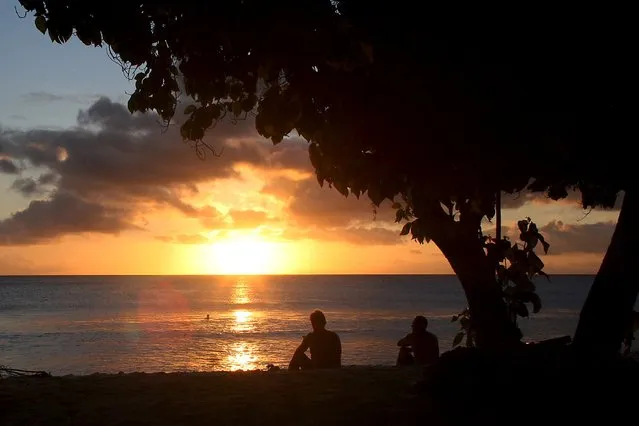
Surfers watch the sun set after surfing along the coast of Kiritimati Island, part of the Pacific Island nation of Kiribati, April 5, 2016. (Photo by Lincoln Feast/Reuters)
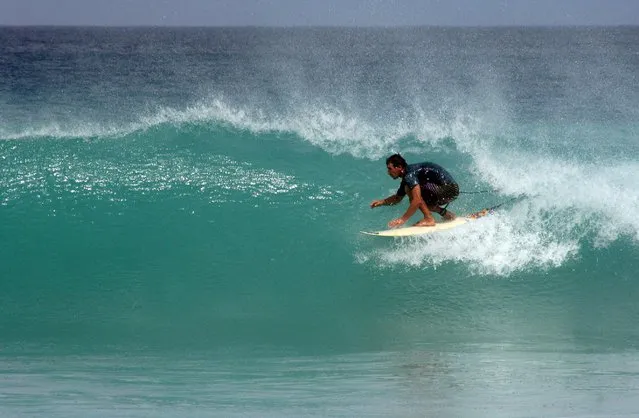
Joao Goncalves, a surfer and hotel owner from the Portuguese town of Peniche, surfs off the coast of Kiritimati Island, part of the Pacific Island nation of Kiribati, April 5, 2016. (Photo by Lincoln Feast/Reuters)
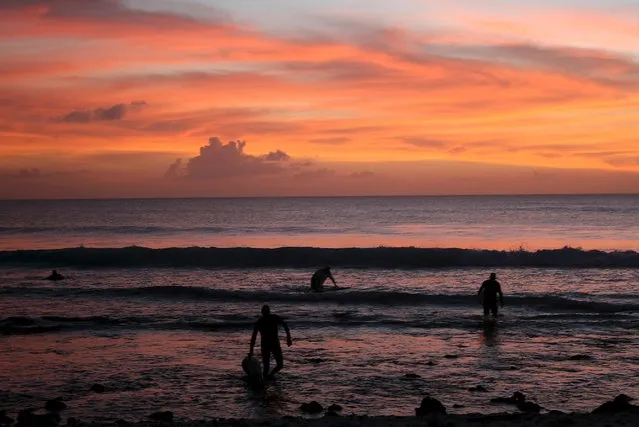
Surfers walk out of the water at sunset after surfing along the coast of Kiritimati Island, part of the Pacific Island nation of Kiribati, April 5, 2016. (Photo by Lincoln Feast/Reuters)
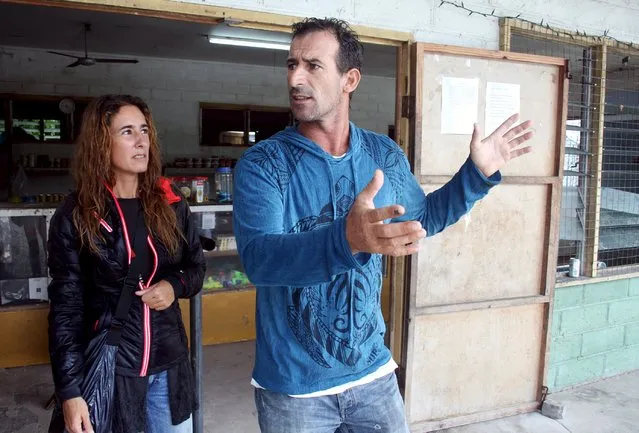
Joao Goncalves, a surfer and hotel owner from the Portuguese town of Peniche, gestures as he stands next to his partner Catarina Sa Nogueira outside a local shop on Kiritimati Island, part of the Pacific Island nation of Kiribati, April 5, 2016. (Photo by Lincoln Feast/Reuters)
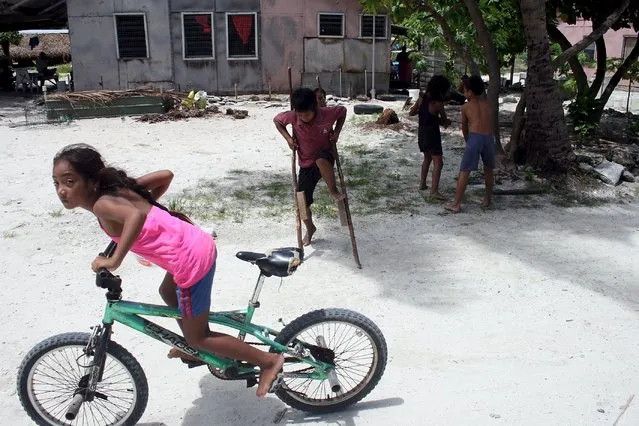
Children play on Kiritimati Island, part of the Pacific Island nation of Kiribati, April 5, 2016. (Photo by Lincoln Feast/Reuters)
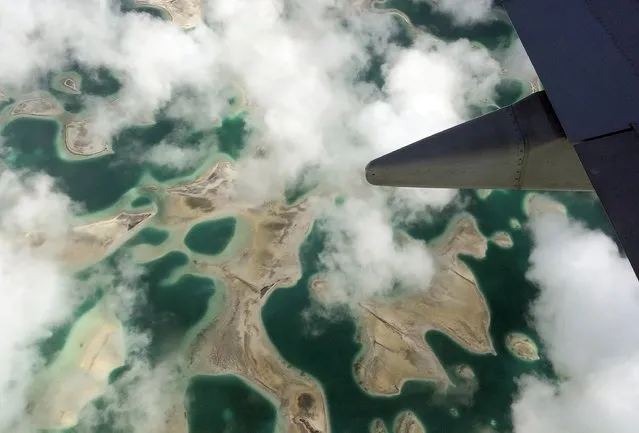
Lagoons can be seen from a plane as it flies above Kiritimati Island, part of the Pacific Island nation of Kiribati, April 5, 2016. (Photo by Lncoln Feast/Reuters)
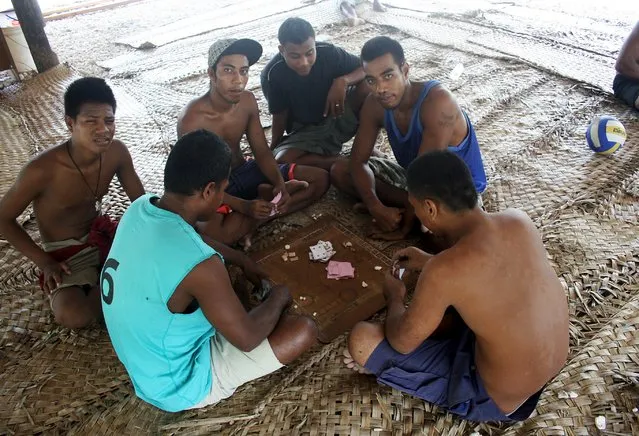
Prisoners play cards under a shelter located in a prison on Kiritimati Island, part of the Pacific Island nation of Kiribati, April 5, 2016. (Photo by Lincoln Feast/Reuters)
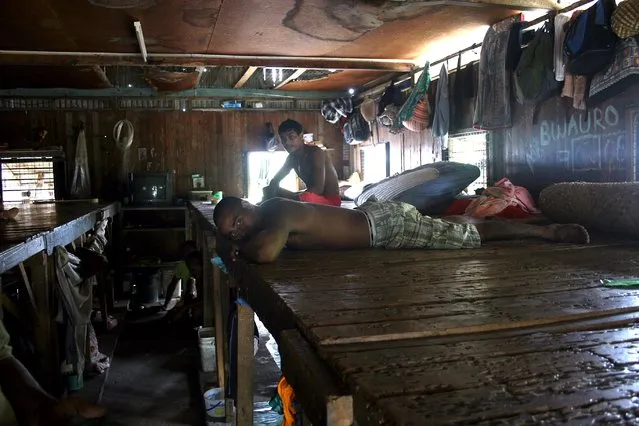
Prisoners lie on their beds inside the sleeping dormitory of a prison located on Kiritimati Island, part of the Pacific Island nation of Kiribati, April 5, 2016. (Photo by Lincoln Feast/Reuters)
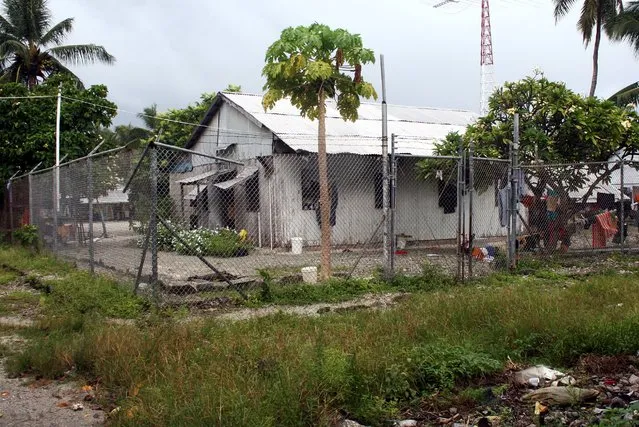
A fence surrounds a prison on Kiritimati Island, part of the Pacific Island nation of Kiribati, April 5, 2016. (Photo by Lincoln Feast/Reuters)
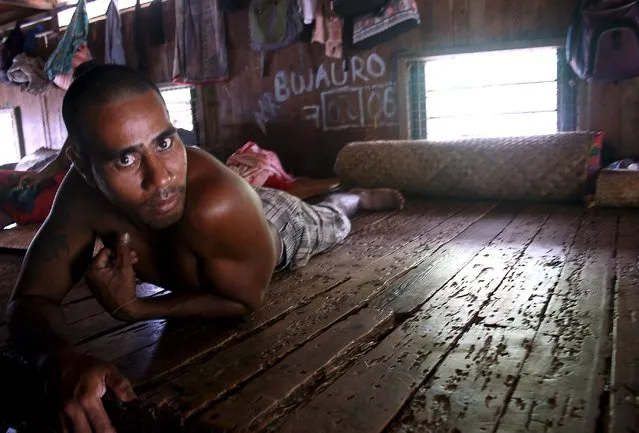
A prisoner lies on his bed inside the sleeping dormitory of a prison located on Kiritimati Island, part of the Pacific Island nation of Kiribati, April 5, 2016. (Photo by Lincoln Feast/Reuters)
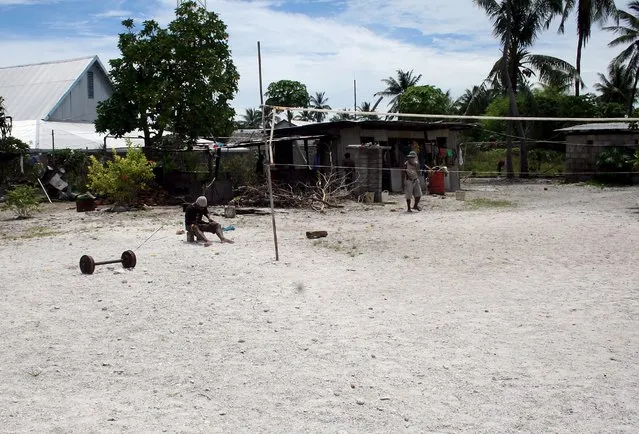
A prisoner makes a fishing net as he sits in the yard of a prison located on Kiritimati Island, part of the Pacific Island nation of Kiribati, April 5, 2016. (Photo by Lincoln Feast/Reuters)
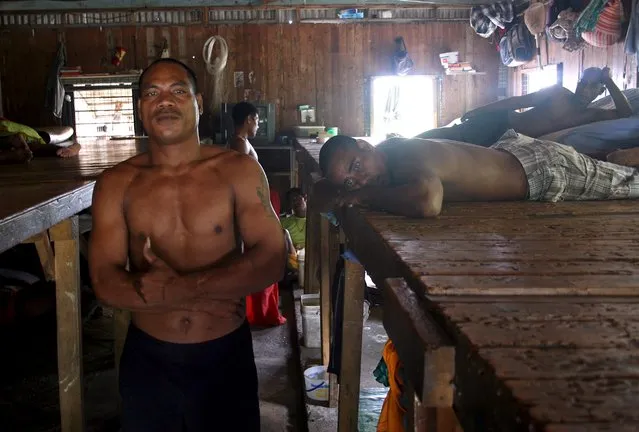
Prisoner Katokiau Maruai (L), stands next to inmates inside the sleeping dormitory of a prison located on Kiritimati Island, part of the Pacific Island nation of Kiribati, April 5, 2016. (Photo by Lincoln Feast/Reuters)
Kiritimati (pronounced Christmas) is a far-flung outpost of the Republic of Kiribati. The world's largest coral atoll, Kiritimati has just one flight a week to either Fiji or Hawaii, four-and-a-half hours in either direction. Tarawa, the capital of Kiribati (pronounced Kee-ree-bahs) lies nearly 3,300 km (2,000 miles) to the west – about three weeks by boat. No lawyers are based on Kiritimati and the High Court only comes once or twice a year to clear a backlog of the most serious cases, bringing a public lawyer for defendants who can't afford their own. Other cases are heard in a local magistrates court, where defendants usually appear without legal representation.
While inmates in the prison have regular access to visitors and no complaints about their treatment, conditions inside are poor. Prisoners – numbering around 50 men, plus one woman and her baby – complain about the inadequate water from the well; the shortages of food; the cramped, hot communal sleeping conditions and the single latrine that often overflows. Flooding El Nino rains earlier this year left water almost knee-deep in the coral rubble yard, where inmates make fishing nets and handicrafts for a little income. Only a handful of guards and a chain-link fence keep the inmates from freedom, though it's more than a day away by boat to the nearest island.
While the marine life is rich, infrastructure is basic and legal services are not the only thing in short supply on Kiritimati, which is home to around 10,000 people. The ship which delivers most of the island's food hadn't been sighted for several months and the weekly flights are also sometimes canceled, most recently earlier in April. For Goncalves, the Portuguese surfer, the cancellation of the flight was a bitter blow. Having been bailed to a local hotel for several months, he was eagerly awaiting the arrival of his lawyer and the judge so his case could be heard. The next High Court hearing in Kiritimati is due, perhaps, in June, so Goncalves is trying to get his case moved to the capital Tarawa. “I need to be at a place that I can be judged”, said Goncalves, his face etched by sun and worry. “All I want at this moment is to be judged. It's impossible”. – Lincoln Feast via Reuters

Surfers watch the sun set after surfing along the coast of Kiritimati Island, part of the Pacific Island nation of Kiribati, April 5, 2016. (Photo by Lincoln Feast/Reuters)

Joao Goncalves, a surfer and hotel owner from the Portuguese town of Peniche, surfs off the coast of Kiritimati Island, part of the Pacific Island nation of Kiribati, April 5, 2016. (Photo by Lincoln Feast/Reuters)

Surfers walk out of the water at sunset after surfing along the coast of Kiritimati Island, part of the Pacific Island nation of Kiribati, April 5, 2016. (Photo by Lincoln Feast/Reuters)

Joao Goncalves, a surfer and hotel owner from the Portuguese town of Peniche, gestures as he stands next to his partner Catarina Sa Nogueira outside a local shop on Kiritimati Island, part of the Pacific Island nation of Kiribati, April 5, 2016. (Photo by Lincoln Feast/Reuters)

Children play on Kiritimati Island, part of the Pacific Island nation of Kiribati, April 5, 2016. (Photo by Lincoln Feast/Reuters)

Lagoons can be seen from a plane as it flies above Kiritimati Island, part of the Pacific Island nation of Kiribati, April 5, 2016. (Photo by Lncoln Feast/Reuters)

Prisoners play cards under a shelter located in a prison on Kiritimati Island, part of the Pacific Island nation of Kiribati, April 5, 2016. (Photo by Lincoln Feast/Reuters)

Prisoners lie on their beds inside the sleeping dormitory of a prison located on Kiritimati Island, part of the Pacific Island nation of Kiribati, April 5, 2016. (Photo by Lincoln Feast/Reuters)

A fence surrounds a prison on Kiritimati Island, part of the Pacific Island nation of Kiribati, April 5, 2016. (Photo by Lincoln Feast/Reuters)

A prisoner lies on his bed inside the sleeping dormitory of a prison located on Kiritimati Island, part of the Pacific Island nation of Kiribati, April 5, 2016. (Photo by Lincoln Feast/Reuters)

A prisoner makes a fishing net as he sits in the yard of a prison located on Kiritimati Island, part of the Pacific Island nation of Kiribati, April 5, 2016. (Photo by Lincoln Feast/Reuters)

Prisoner Katokiau Maruai (L), stands next to inmates inside the sleeping dormitory of a prison located on Kiritimati Island, part of the Pacific Island nation of Kiribati, April 5, 2016. (Photo by Lincoln Feast/Reuters)
28 Apr 2016 12:01:00,
post received
0 comments
